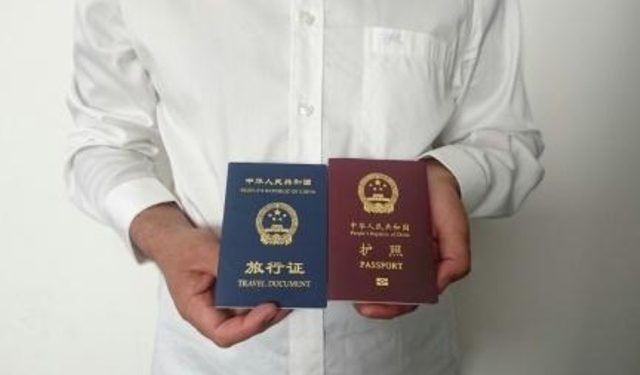
A student of the Muslim Uyghur minority in the Kingdom, tearful in his eyes, holds his Chinese passport, which has been long since his expiration date, which puts him facing a mysterious fate, with the increasing rapprochement between the Kingdom and Beijing.
The Chinese consulate in the Kingdom stopped renewing the passports of the Muslim ethnic minority for more than two years, in a move described by activists as a pressure tactic practiced by Beijing in a number of countries to force the Uyghurs abroad to return to their country.
About six Uighurs families in the conservative Kingdom offered their passports to the French News Agency, a few of which have expired and some are close to the expiry date, and they all confirmed that they feared returning to China where more than a million Uyghurs are believed to be held in detention camps.
“Even animals in other countries are allowed to obtain passports,” said a 30-year-old Chinese religious student in Medina, whose passport expired in 2018 with sorrow.
“Either they renew my passport or they allow me to give up my nationality. They make us feel like people without value.”
This Muslim Chinese community, which Beijing now offers its members a one-way travel document, which is only China, faces an impossible choice between returning to their homes, which exposes them to the risk of arrest, or staying illegally in the Kingdom in the face of a constant fear of deportation.
“The refusal to renew the passports is part of China’s strategy to get rid of the Uyghur expatriates, forcing them to return to China,” said the Uighur linguist residing in Norway, Abdelwali Ayoub.
“What awaits them on the other side (in China) is detention,” he said.
Compounding the fears of this Chinese Muslim minority is the apparent silence of the large Muslim countries, such as Egypt and Pakistan, regarding China’s treatment of the Uighurs because it avoids angering Beijing, the great economic power.
But what worries them in particular is the great improvement in relations between China and the Saudi regime, which overlooks China’s policy towards the Uyghurs, as Beijing is the largest importer of Saudi oil.
Chinese media quoted Crown Prince Mohammed bin Salman as saying last year that the kingdom supports “China’s rights to take measures to combat terrorism and extremism.”
On the other hand, this year, China supported the kingdom over its handling of the trial of journalist Jamal Khashoggi, which drew international criticism after Bin Salman’s closest aide was acquitted.
It is believed that a few hundred Uyghurs are present in the Kingdom and are a vulnerable community of religious school students, merchants and asylum seekers, many of whom are separated from their families held in China.
A Uighur businessman in the Kingdom explained that many of them are concerned about what they call suspected Chinese spies while others are forced into hiding.
The man showed copies of eight expired passports to his Uighur colleagues, which made their stay illegal. “I expect the number of stateless Uyghurs to grow in the next two years,” he said.
Many of them escaped during the recent period, often heading to Turkey or Sweden.
A Uygurian student in the Kingdom said that three of his friends were deported in late 2016 “we cannot track down” after their arrival in China, and they are now most likely in re-education camps that Beijing says are aimed at countering extremism.
“We don’t know their condition, what happened to them?”
Ayoub confirmed five cases of deportation from the kingdom since 2017, but other activists said the number was higher. According to press reports, similar deportations took place in Egypt and Thailand.
It is not clear whether Riyadh has carried out deportations under pressure from China or whether they have fallen victim to a crackdown on the Saudi authorities against illegal residents.
The Chinese embassy in Riyadh said it was “not cooperating with the Saudi authorities to deport the Uyghurs.”
In response to a question about their refusal to renew passports, she stated only that she had not stopped the consular services of their “brothers and sisters” in the Uyghurs.
Several members of the Muslim ethnic minority said they were afraid to visit the Chinese consulate in the Kingdom because some of their passports were revoked even before the expiration date.
In a letter sent last year to the Chinese consulate in the city of Jeddah in the west of the Kingdom, a group of Uighurs students asked why it had renewed the passports of the Han ethnic group in the Kingdom while ignoring their requests.
“We are from the same country,” the message said. “We have not been able for two years to meet or communicate with our fathers, mothers and brothers in China, we do not know what happened to them and we heard bad news in them and that they are imprisoned in prisons because of our studies in the Kingdom.”
Several activists, citing government documents, said that the Chinese authorities are targeting Uyghurs who are present in 26 “sensitive” countries, including Saudi Arabia, because they consider them vulnerable to “extremist ideology.”
Uyghurs who have ties to the Kingdom are particularly vulnerable amid what observers describe as the Beijing campaign to “combat Saudization” to tackle the influence blamed on the introduction of extremism in Chinese Islam.
“Greeting someone in the Arabic language, studying the independent Qur’an, and even naming the children Muhammad or Saddam are all major signs of extremism that can lead to arrest or imprisonment for the Uyghurs,” said Darren Peeler, University of Colorado researcher.
The Uyghur families deny any links to extremism. “I don’t want to carry and bring a child into this world, the child will get a blue document and a bleak future,” said a Uyghur woman, referring to the travel document with which they can travel only to China. “We feel powerless,” she stressed.